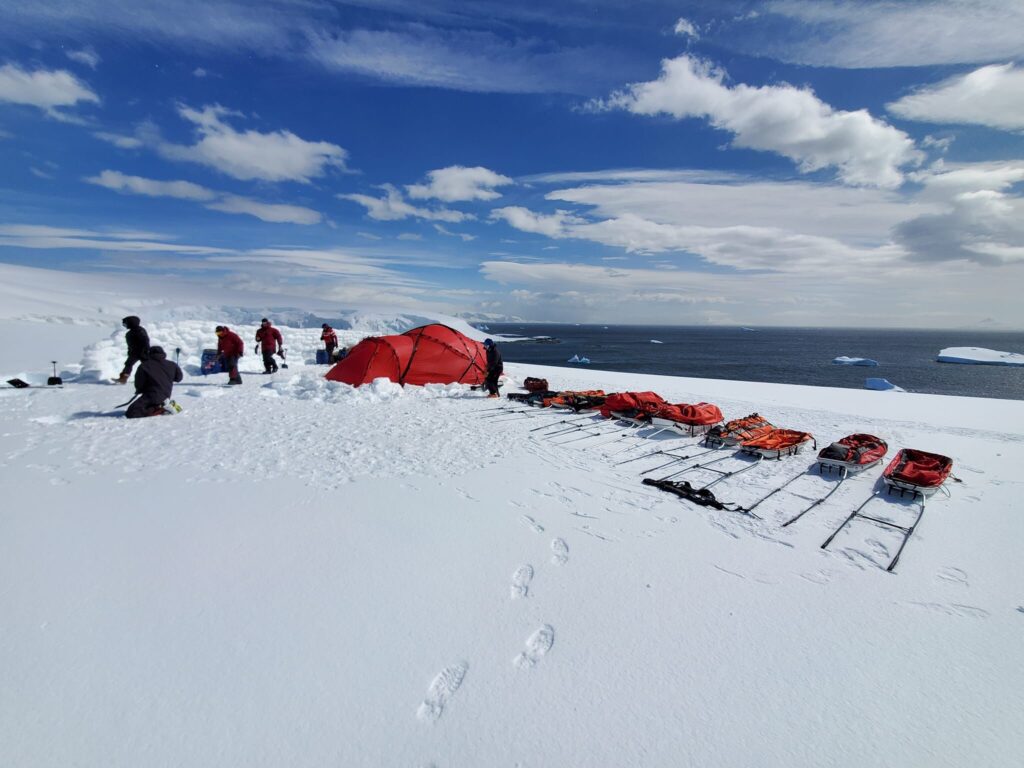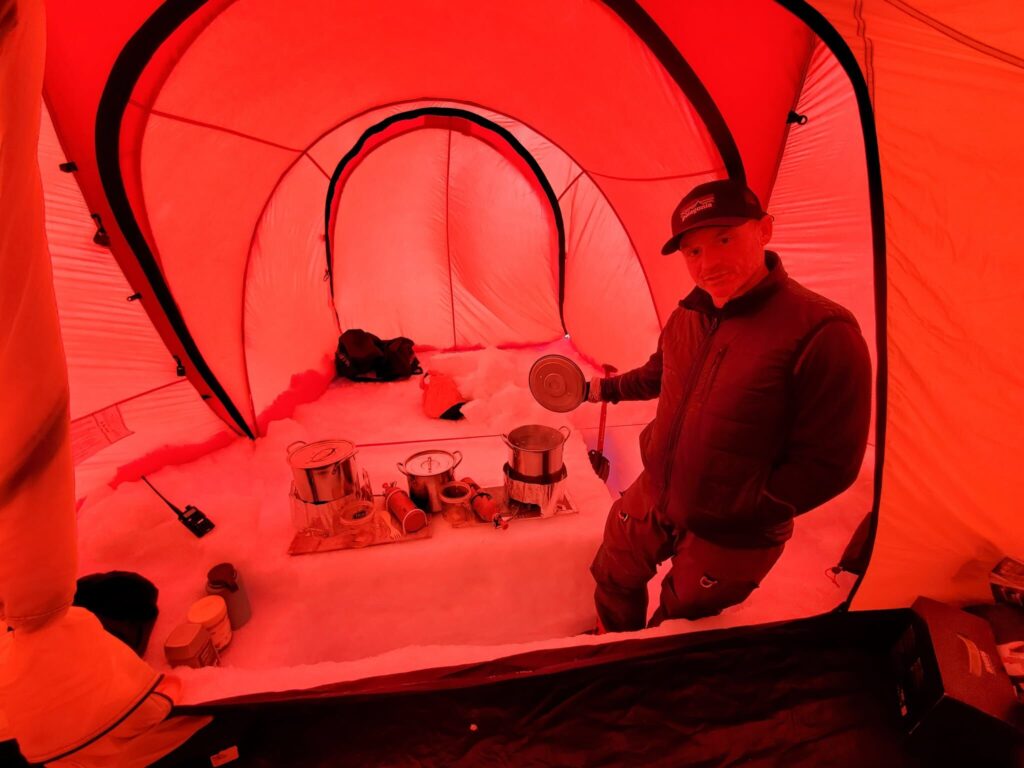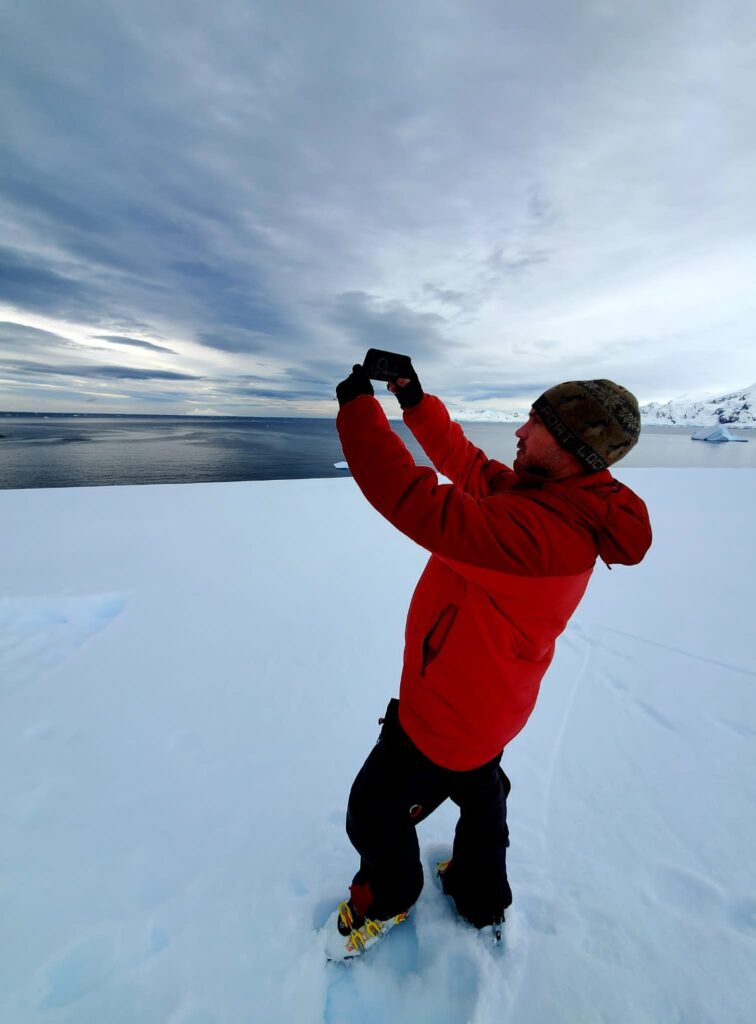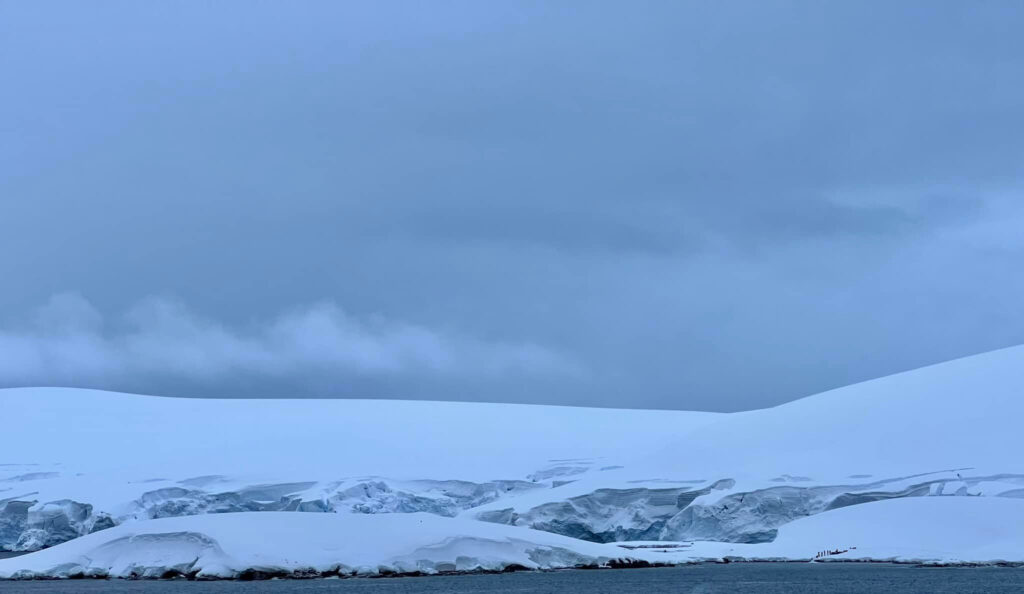As eight explorers turn their backs to the departing ship, they know that for the next six weeks, the team are totally self-reliant.
Now, they are alone with the elements: mountains and ice and weather – all important to the success of the expedition and also subjects of its scientific projects.
Why do we talk so much about the weather? Because, when we step out of the warmth of our houses to work the land or fish the seas, we are exposed and our fortunes turn with the weather.
That’s no different for the Antarctic Quest 21 team, whose first job on land was to build shelter, their base camp at Portal Point, complete with tents, cooking stations and a 5 foot wall of compressed snow blocks to deflect some of the high winds forecast for their first few days ashore.


Meteorological observations are also essential auxiliary records for all of the science projects: wind speed and direction, air temperature, precipitation and sky – type, appearance and altitude of clouds, colour of the sky and cloud cover.

All of these records will be shared with all the scientists and complement the data sets they’ll obtain from analysing the samples the expedition will bring back for them.
Sky observations are also recorded in the NASA GLOBE Observer App. This citizen science project is open to everyone, everywhere, anytime – and if that sounds to you as if this is not ‘serious science’, think again:
Clouds are not just an aspect of our daily weather, they also reflect, absorb and scatter sunlight and infrared emissions from Earth. As such, they prevent direct sunlight reaching and heat the ground and they work as a blanket that reduces the amount of heat, or infrared radiation, that escapes from the ground and lower atmosphere into space. In this way, clouds control the exchange of heat in the atmosphere, and therefore play an important role in regulating the Earth’s climate. Different types of clouds have different effects on this energy regulation and long-term changes in cloud cover and prevalence of certain cloud types can have significant impacts on climate and in turn, changes in climate can have significant impacts on cloud formation. For this reason, accurate and frequent data collection on clouds in all areas of the planet are important for understanding their changes and their impact over time.

Satellites continuously observe clouds and measure the Earth’s energy balance from space. However, satellites only ‘see’ the top of clouds and are unable to provide information about the cloud base or multiple layers of clouds. Furthermore, some cloud types are difficult to detect and clouds above areas covered in snow can be hard to distinguish from the white ground cover. Observations from the ground made by informed eyes and supported by photographic evidence complement the satellite data by adding valuable detail, enabling researchers to get a more complete picture of clouds in the atmosphere.
In this context, ground observations that are matched to satellite overpasses or geostationary satellites are particularly valuable, as they allow the creation of composite images by an observer on the ground and a satellite looking at the same cloud within a 15-minute time window.
Moreover, NASA GLOBE Observer is part of the GLOBE Program, which means that thousands of schools across the world can access the collected data by citizen scientist around the world, supporting science education and student research. By contributing rare cloud observations from remote regions of the Antarctic Peninsula, the expedition will make a significant contribution to data bases used for both, research and education.

“Dr Charlotte Braungardt is a freelance environmental scientist working through her consultancy Challenging Habitat. She is the scientific advisor for the Antarctic Quest 21 expedition.”
Many thanks to all of our friends, sponsors and supporters who are backing the Antarctic Quest 21 expedition, including:
NAAFI Team Army/Team Ethos Costain Group PLC BetterYou Ltd Applied Satellite Technology LtdGreencastle Consulting Klättermusen AB Fjellpulken AS Polar Latitudes Clean Planet Energy PlanetLabs.Earth LikeToBe.org LGfL Devon and Plymouth Chamber of Commerce Royal Geographical Society Prof Dr Ger Graus OBE Phil Carrotte Tim Ellis Twin Science & Robotics Verofax Limited Alpenverein Osterreich Beyond Exploration Shackleton Whisky Paul Read Martin Holland, FRGS USNAR Polar Science and Technology Program The Ulysses Trust Expedition Base Camp Anjuli Selvakumaran Elliot Brown Watches University of Plymouth Utrecht University The University of Manchester Durham University University of Tasmania Challenging Habitat AndrewSmedley PippaWhitehouse Colonel Paul John Edwards MBE The Honourable Alexandra Shackleton Lieutenant General Richard Nugee CB CVO CBE AngelaMilne Simon Ussher Nigel Marley MichielvanDenBroeke ImogenNapper Emily Whitehead Kate Retallick Claire Grogan FRGS Charlotte Braungardt
#wornbyadventurers #NAAFI1920 #TeamArmyUK #CostainGroup #betteryou_ltd #klattermusen #TheASTGroup #greencastleconsulting #Fjellpulken #expeditionfoods #polarlatitudes #theshackletonwhisky #rgs_ibg #ewhiteheaduk #unavco #oinkandsqueal #ragingbullbiltong #thegiftofoil #theludlownutcompany #ohso_goodforyou #nudiesnacks #pearlscakes #britanniaassociation #request2021#liketobe.org #ceraphienergy #AndrewSmedley PippaWhitehouse #AngelaMilne Simon Ussher #Nigel Marley #MichielvanDenBroeke #ImogenNapper